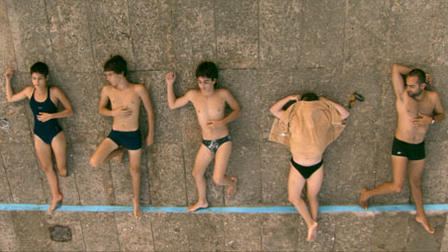 At some outdoor pool in Havana (so catalogue notes inform us), Esteban (Raúl Capote) arrives to teach four disabled teenagers a swimming lesson: Dona (Mónica Molinet) has one leg, Dany (Marcos Costa) has Down’s syndrome, Rodrigo (Felipe García) has defective legs and Oscar (Carlos Javier Martinéz) is, apparently, mute. Thin on incident and thick on mood, Cuban director Carlos Machado Quintela’s debut feature is just the sort of work about which programmers and critics alike fall head over heels in love with because it says precisely nothing about the world in which we live.
At some outdoor pool in Havana (so catalogue notes inform us), Esteban (Raúl Capote) arrives to teach four disabled teenagers a swimming lesson: Dona (Mónica Molinet) has one leg, Dany (Marcos Costa) has Down’s syndrome, Rodrigo (Felipe García) has defective legs and Oscar (Carlos Javier Martinéz) is, apparently, mute. Thin on incident and thick on mood, Cuban director Carlos Machado Quintela’s debut feature is just the sort of work about which programmers and critics alike fall head over heels in love with because it says precisely nothing about the world in which we live.
It’s not difficult to see the appeal. To someone in the arts scene or on the festival circuit, for whom funding is everything and committing to anything resembling a political opinion can be dangerous, this kind of elegantly shot enigma appears as profound as it is beautiful, allowing one to wallow in its contemplative register. And on first sight, The Swimming Pool (La piscine) is full of arresting compositions. Even a scene in which one character begins to drown another is beautifully composed. Geometric compositions appear to counteract the human figures that move imperfectly through the rigid, fixed-camera frames. A swimming pool never looked so hostile.
The site that gives Machado Quintela’s film its title has a tradition of cinematic allegory, of course, from The Swimmer (1968) to Deep End (1970) to The Pool (2012). Like Deep End especially, The Swimming Pool takes place in and around a space of bodily limitations, of gender fluidity (Dona, the only female present, sports a boyish bob) and of potential traumas. For no apparent reason, for instance, Oscar is subjected throughout to bullying and worse. Esteban does little to prevent such a dynamic: in one scene, in which he converses with another, older swimming instructor, he too seems to be the subject of humiliation.
There’s an unpleasant air that hovers over this body of water. Because it has no explicit allegorical function, Abel Arcos’s script is a dispiriting experience, one in which irritation sets in quick – irritation that someone has written such material, and irritation that another person has opted to frame the whole thing so po-facedly. A particularly sour episode is that in which our mostly obnoxious ciphers sit around a table and munch burgers. Dany and Dona begin to compete to see who can down theirs the quickest, while the others grin excitedly. Machado Quintela shoots the escapade in tight close-ups and amps up Sergio Fernández Borrás’s sound to capture that unbearable squelch of food being chewed and swallowed.
Everything is a competition, in fact: later, Esteban reluctantly agrees to follow through on a promise to race Dona before the rest of the gang. Rivalry, it seems, is an inescapable part of life. It’s fair enough if this Buñuellian scenario wants to operate on some suggestive and symbolic level of understanding, but in making this real non-odyssey of a slog, Arcos and Machado Quintela have mistaken humourlessness for seriousness.
You can follow Michael Pattison on Twitter @m_pattison.




